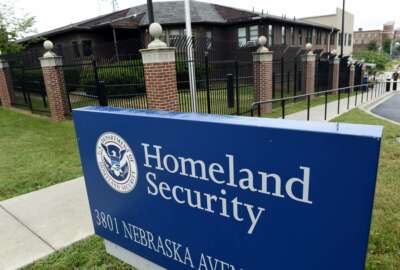To listen to the Federal Newscast on your phone or mobile device, subscribe in PodcastOne or Apple Podcasts. The best listening experience on desktop can be found using Chrome, Firefox or Safari.
- Two representatives are calling on President-Elect Joe Biden to stray away from appointing people with defense industry ties to Pentagon positions. Rep. Barbara Lee (D-Calif.) and Mark Pocan (D-Wis.) warn that appointing former industry heads could cause bloated military budgets. Under the Trump administration, former Defense Secretary Mark Esper previously worked as a lobbyist for Raytheon. Former Acting Defense Secretary Patrick Shanahan served as a Boeing executive for three decades and Jim Mattis served on the board of General Dynamics.
- The Cybersecurity and Infrastructure Security Agency appears to be in the midst of a house cleaning. Bryan Ware, the assistant director of the cybersecurity division at CISA, is leaving today, and CISA Director Chris Krebs may soon be following him out the door. Ware unexpectedly resigned yesterday, announcing his last day would be November 13. Meanwhile, Reuters is reporting that Krebs told people he expects to be fired by the White House. Both cyber leaders are well-respected across CISA and within the federal community. Ware led the development of CISA’s 2025 strategy. Krebs has been a leading voice on everything cyber from securing federal networks to election security.
(Federal News Network)
- The House took another step forward, technologically. Speaker Nancy Pelosi (D-Calif.) received word from Rep. Zoe Lofgren (D-Calif.), chair of the committee on House Administration, that technology now exists to conduct secure remote voting. Because of the pandemic, until now the House has allowed remote voting by proxy. But research among state and foreign country legislatures, aided by the intelligence community, has turned up ways to do full remote floor voting. House members still must agree on rules for remote voting. The House has had tens of thousands of online hearings and debates since the advent of the pandemic.
- Military retirees will see less of a cost-of-living-adjustment increase than in previous years. Military retirees will see a 1.3% increase to the money they receive from the government in 2021. That is a decrease from the 1.6% retirees received in 2020 and a sharp decline from the 2.8% they got in 2019. The cost of living adjustment is calculated each year by comparing the consumer price index from the previous year to the current year. There are currently 2.18 million military retirees who receive pay from the government. Military family members receiving survivor pay will also see the same COLA increase. (Federal News Network)
- The largest union at the Department of Veterans Affairs said things are not nearly settled with its bargaining agreement. The Federal Service Impasses Panel may have weighed in on a big portion of VA’s contract with the American Federation of Government Employees. But AFGE says it still has two outstanding lawsuits, 22 negotiability appeals, and one unfair labor practice pending. It has also filed six national grievances against the VA over the course of the bargaining negotiations. VA described the decision from the impasse panel as a win for veterans. (Federal News Network)
- Senate Small Business and Entrepreneurship Committee Chairman Marco Rubio (R-Fla.) is seeking more information on the Economic Injury Disaster Loan program, that a watchdog flagged for billions in potentially fraudulent payments. Rubio is asking the Small Business Administration for information on employees and contractors who allegedly approved loans for themselves or inappropriately influenced other loan approvals. The senator is also asking SBA for details of its hiring and vetting process for employees brought on through emergency hiring authority, writing that it is critical that congress protect taxpayer dollars, as it works toward future small-business relief.
- All eyes are on the Census Bureau as the 2020 count draws to a close. The Census Bureau faces a time-crunch processing data from the 2020 count ahead of a December 31 deadline, but the Census Scientific Advisory Committee recommends the bureau keep watchdogs and the public in the loop on its progress. The committee recommends the bureau release detailed metrics that will help the public understand the quality and confidence the bureau has in the data it will release. Committee Chairwoman Allison Plyer says that will help build trust in not only the decennial count, but also the bureau’s other statistical surveys. “We need radical transparency from the Census Bureau transparency is really critical at this point,” Plyer said.
- A key part of the 46-year-old Privacy Act is moving into the 21st century. The Office of Management and Budget’s new guidance is giving agencies a year to let citizens validate and verify their identities online, when asking for their records. Agencies also have to put access and consent forms online for citizens using properly vetted identity credentials. The memo implements the Creating Advanced Streamlined Electronic Services for Constituents Act of 2019 or the CASES Act, which President Donald Trump signed into law in August of last year.
- The Interior Department’s fee-for-service Interior Business Center has a new director: Byron Adkins. He previously led the facilities and environmental policy office in the Commerce Department. And he has also managed facilities for Agriculture’s Eastern Business Center.
- The Homeland Security Science and Technology Directorate has been hosting a series of Biometric Technology rallies this year. The pandemic caused a change to the focus of the rallies. DHS asked industry for facial recognition systems that worked in spite of masks or other PPE. Results will be released later this month.
Copyright
© 2024 Federal News Network. All rights reserved. This website is not intended for users located within the European Economic Area.



